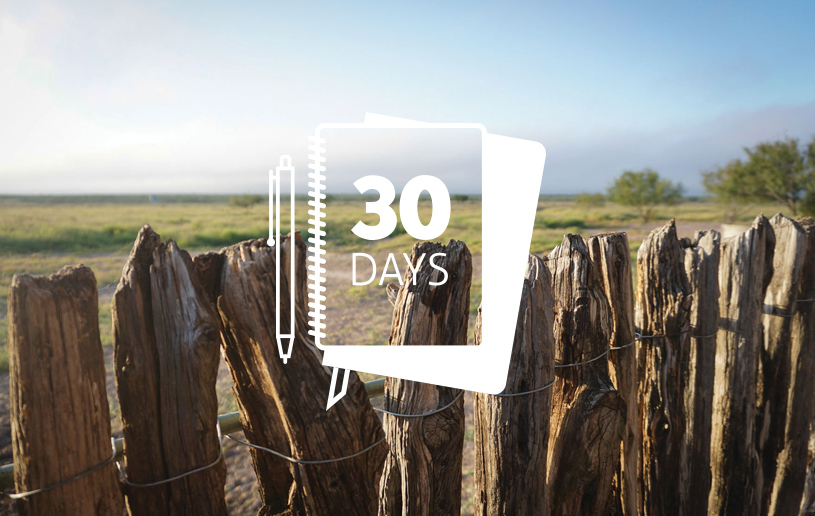
This inductive study is designed to create a better understanding of setting boundaries. For the next 30 days read the questions and allow them to spark deeper personal reflection and life change.
In interpersonal relationships, a boundary is what separates people from each other so they can have separate identities, responsibilities, and privileges. Healthy boundaries define our identities, create necessary space between individuals, define expectations, and show respect for others. Personal boundaries help us say yes to the good and no to the bad.
- Read Genesis 1:1; Acts 17:24. Boundaries are rooted in the nature of God, who is distinct and separate. How is this important when it comes to your idea of God?
- Read Isaiah 6:1-5; 64:6-7. God is holy and sinless, opposite of us. How does God set a boundary in relation to sinful man? What is the purpose of this boundary?
- Read Psalm 24:1-2. What is the basis for God’s boundaries and standards? How does this give Him the right to set boundaries? How are boundaries tied to ownership?
- Read Psalm 24:3-6. What boundaries does God set for who can come into His presence? What is the consequence of not living up to His standards? Who’s responsible for that?
- Read Genesis 1:27; 2:15-16. God made us in His image as responsible beings capable of understanding consequences. How is this foundational to your understanding and setting of boundaries?
- Read Genesis 2:15-16; 3:12-13. God gave Adam and Eve freedom within a boundary. How is keeping a boundary also a means to your protection, happiness, and freedom?
- Read Genesis 3:8-13. How do Adam and Eve respond to their failure to honour God’s boundary? How does overstepping boundaries go along with failing to take personal responsibility?
- Read Exodus 20:1-20. God defines His boundaries all through Scripture telling us what He thinks, feels, plans, likes and dislikes. Who’s in charge of your boundaries?
- Read Job 1:10. Boundaries are often for protection. What things in your life do you value and want to protect? What boundaries have you put in place for protection?
- Read Mark 3:31-35. How does this demonstrate Jesus’ boundaries? What other example of His boundaries can you think of? What example does this set for you?
- Read Mark 10:14. Which of Jesus’ boundaries did the disciples violate? If you become angry because someone violates your boundaries, have you sinned? How did Jesus model assertiveness?
- Read Matthew 6:6. Why is this an important boundary to set? What other steps can you take in order to protect your walk with the Lord?
- Read 2 Corinthians 5:17. Who you are is rooted in your identity in Christ. How do boundaries flow from this? How are they determined by God’s standards?
- Read 2 Corinthians 6:14; James 4:4. What boundary is identified here? How does it flow from your identity in Christ? How do proper boundaries aid in your spiritual growth?
- Read Matthew 5:37. Having clear responses is setting the most basic boundaries. “No” is a complete sentence. How do your words give others a sense of where you stand?
- Read Proverbs 29:25. Fear often keeps people from setting boundaries. How does remembering your identity and to whom you must give account help overcome fear?
- Read Proverbs 19:19. Setting boundaries sometimes makes others angry. Whose problem is the anger? Why is it important not to react or change your boundary in the face of anger?
- Read 2 Corinthians 6:17. What boundary are you to set in relation to non-believers? Why is this important? What is the purpose behind this type of boundary?
- Read Romans 13:1-4. What is the purpose of boundaries in society? What happens in society if there are no consequences for overstepping laws?
- Read Romans 14:1-4. A person with healthy boundaries takes responsibility for his own life and allows others to live theirs. What boundaries regarding non-moral matters have you encountered?
- Read Romans 14:14-23. 1 Corinthians 10:27-33. The Lord gives you freedom to choose boundaries when it comes to non-moral matters. What limits are put on that freedom?
- Read Philippians 2:1-8. How do you maintain an attitude of humility toward others and regard their interests and boundaries while respecting who you are and your boundaries?
- Read Hebrews 13:4; 1 Corinthians 7:1-6. What boundaries does a healthy marriage require? What are the consequences of violating these boundaries?
- Read Ephesians 5:33. How can boundaries help a married couple love and respect each other as they are commanded? What boundaries can help married people protect their marriage?
- Read Proverbs 19:18; 22:6. Why are boundaries necessary in parenting? What does setting healthy limits for children do for them? How do boundaries develop a child’s separate identity?
- Read Galatians 6:2. How does this verse show your responsibility to others and the excessive loads they may be carrying? Whose excessive loads are you helping to carry?
- Read Galatians 6:5. Everyone has his or her own responsibilities to carry. How is this different from Galatians 6:2 and helping carry others’ excessive burdens?
- Read Galatians 6:2, 5. How does understanding the distinction made in these verses help you make a distinction between what is your responsibility and what is not?
- Read Galatians 6:2, 5. What problems arise when you fail to understand what is your personal responsibility and what is another’s? How can you set boundaries if you have overstepped?
- Read Ephesians 4:26. How do you respond when someone violates your boundaries? How is stating what your boundary is more effective than saying what you don’t want?

